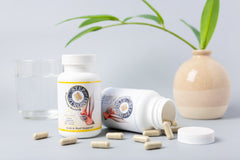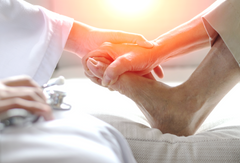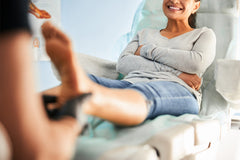What Foot Problems to Expect When You’re Expecting and How to Minimize Them

by Dr. Emily Splichal, DPM MS
As a woman enters the third trimester of pregnancy, more than just a growing belly may start to slow her down. Tired, swollen, and aching feet are a common complaint as women enter the final stages of pregnancy.
Outside of the obvious increase in body weight, why are feet stressed during pregnancy and what can be done to minimize these changes that a woman may be experiencing.
Swollen Feet
This is the most common foot problem experienced by pregnant women and is associated with excess fluid in the tissue and position of the baby. Typically, increased fluid develops in the third trimester when hormones are the most elevated and blood pressure increases.

To reduce swelling, try to put the feet up whenever possible, stretch the legs frequently, wear wide comfortable shoes that can stretch as feet swell, and try not to cross the legs when sitting.
Varicose veins are another common but rather harmless part of pregnancy for some women. Varicose veins occur when there is impaired return of blood from the legs back up to the heart. This backing up of the blood puts pressure on the valves of the veins, eventually forming enlarged and often painful veins.

Compression stockings or socks, putting feet up, wearing belly support belts and limiting time on the feet can all reduce the risk of varicose vein formation.

Studies have documented changes in foot size during pregnancy occurring in up to 60% of women. On average, a woman's arch height will decrease causing foot length to increase between 2 and 10 millimeters.
The cause? Pregnant women produce a hormone called relaxin which increases the looseness of the joints and ligaments, possibly making the foot structure more malleable.
Using arch supports during the third trimester and for 3 months postnatal can help prevent changes in foot shape and size.
An increase in body weight combined with a changing foot structure can lead to excess stress and fatigue of the foot muscles and plantar fascia. Daily massage or a release of the feet, followed by stretching of the calf can help minimize foot and arch pain.




Leave a comment